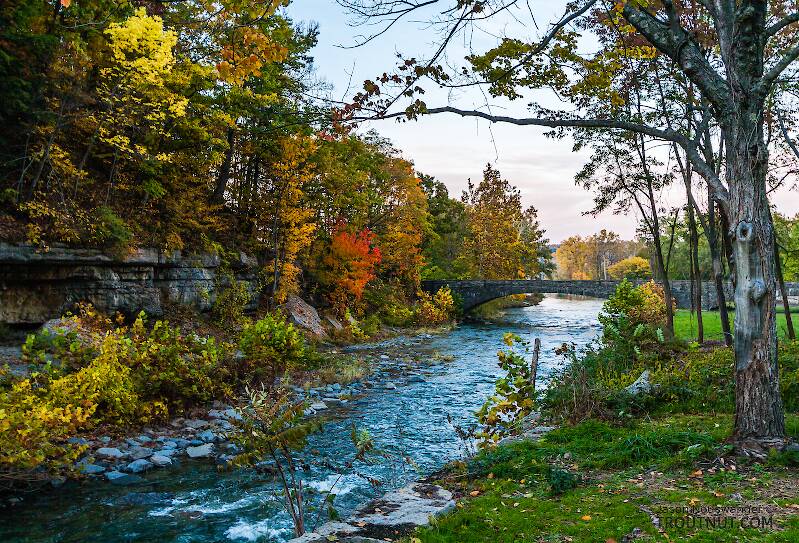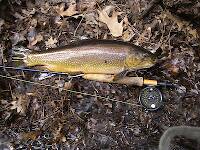
Blue-winged Olives
Baetis
Tiny Baetis mayflies are perhaps the most commonly encountered and imitated by anglers on all American trout streams due to their great abundance, widespread distribution, and trout-friendly emergence habits.
Featured on the forum

As far as I can tell, this species has only previously been reported from one site in Oregon along the Columbia gorge. However, the key characteristics are fairly unmistakable in all except for one minor detail:
— 4 small yellow spots on frons visible in photos
— Narrow occipital spinule row curves forward (but doesn’t quite meet on stem of ecdysial suture, as it's supposed to in this species)
— Short spinules on anterior margin of front legs
— Short rposterior row of blunt spinules on abdominal tergae, rather than elongated spinules dorsally
I caught several of these mature nymphs in the fishless, tiny headwaters of a creek high in the Wenatchee Mountains.
— 4 small yellow spots on frons visible in photos
— Narrow occipital spinule row curves forward (but doesn’t quite meet on stem of ecdysial suture, as it's supposed to in this species)
— Short spinules on anterior margin of front legs
— Short rposterior row of blunt spinules on abdominal tergae, rather than elongated spinules dorsally
I caught several of these mature nymphs in the fishless, tiny headwaters of a creek high in the Wenatchee Mountains.

Troutnut is a project started in 2003 by salmonid ecologist Jason "Troutnut" Neuswanger to help anglers and
fly tyers unabashedly embrace the entomological side of the sport. Learn more about Troutnut or
support the project for an enhanced experience here.
Aaron7_8 on Sep 18, 2008September 18th, 2008, 2:40 pm EDT
Good stuff guys. Everyone is entitled to an opinion.
Jason, thanks for keeping the dialogue going (and labeling it for what it is), as a fan of education there is really no bad information as long as it is accurate. Anything that gives you an inormed decision is valid especially on an issue as important as this election.
Tight lines and heavy hatches to all.
Jason, thanks for keeping the dialogue going (and labeling it for what it is), as a fan of education there is really no bad information as long as it is accurate. Anything that gives you an inormed decision is valid especially on an issue as important as this election.
Tight lines and heavy hatches to all.
Troutnut on Sep 18, 2008September 18th, 2008, 6:25 pm EDT
Good post, Lee. I know a website you'll really enjoy, if you aren't familiar with it already. It's by far the best resource for the "horse race" aspect of the election, following polls and such with very statistically intelligent commentary about their interpretation.
http://www.fivethirtyeight.com/
It's run by a baseball analyst who used a demographic regression model, combined with polls, to consistently predict the results of Democratic primary races better than pretty much any pollsters or mainstream media outlets. He's applying an improved version of that model to follow the current state of the general election now, and he presents information with the appropriate caveats and assumptions to prevent people from overreaching with their conclusions.
http://www.fivethirtyeight.com/
It's run by a baseball analyst who used a demographic regression model, combined with polls, to consistently predict the results of Democratic primary races better than pretty much any pollsters or mainstream media outlets. He's applying an improved version of that model to follow the current state of the general election now, and he presents information with the appropriate caveats and assumptions to prevent people from overreaching with their conclusions.
Jason Neuswanger, Ph.D.
Troutnut and salmonid ecologist
Troutnut and salmonid ecologist
RleeP on Sep 19, 2008September 19th, 2008, 5:42 am EDT
Thanks, Jason..
I've been using and really like 538.com. He really does some neat things with the numbers, and not just for show either. Very useful stuff..
One thing I wasn't aware of was that the guy was a baseball analyst.
This would follow, I'd think..
In a discipline where one of the goals is to determine the percentage of times that left hand hitters reached base when coming to the plate on Tuesdays during periods of wind velocity in excess of 12 knots, air temps were below 11 C, dew points below 55% and Mercury was in the house of Virgo and the hitters wife was in the house of her Mother-in-Law (old Nick Lyons joke..), it doesn't surprise me that he would also do a good job at electoral analysis...:)
Lee
I've been using and really like 538.com. He really does some neat things with the numbers, and not just for show either. Very useful stuff..
One thing I wasn't aware of was that the guy was a baseball analyst.
This would follow, I'd think..
In a discipline where one of the goals is to determine the percentage of times that left hand hitters reached base when coming to the plate on Tuesdays during periods of wind velocity in excess of 12 knots, air temps were below 11 C, dew points below 55% and Mercury was in the house of Virgo and the hitters wife was in the house of her Mother-in-Law (old Nick Lyons joke..), it doesn't surprise me that he would also do a good job at electoral analysis...:)
Lee
Falsifly on Sep 19, 2008September 19th, 2008, 9:28 am EDT
Trtklr makes a good point that people should be able to escape from politics here if they want to, and not be tricked into reading a political thread.
My emphasis added.
I am sure that Louis intended no such thing, but since the word popped up I thought I would add my two cents and let you decide
its worth. A question really.
What is the name of world’s largest organized crime syndicate, full of deceit, lies, corruption, crime, scandal, and trickery, unbounded with power and authority?
One that claims to be for the people by the people, and then determines who the people are.
One that grants and stands in defense of your civil rights, and then slowly strips them away, all for your own good.
One that promises to protect us from the greed and wrong doing of which it is most guilty.
One that offers us the power of control though the electoral process, yet controls that very process.
One who’s control and regulation more often than not, results in total disaster.
One that holds Corporate America to a standard that itself cannot keep.
One that hides itself in a legal shroud and maintains absolute authority to interpret the law.
One that sold out a countries financial security and independence to a handful of elite world bankers.
One that promises future financial security and than robs you blind.
Yes, the one that controls your very existence, where you can walk, how you can talk, the food you eat, the water you drink, even the air you breathe.
Oh what a tangled web we weave,
When first we practice to deceive!
Sir Walter Scott
IMMHO I don’t think it matters who you vote for. I don’t think Obama and Biden or McCain and Palin are going to change a thing. I don’t think we have even come close to addressing the real underlying issues at fault for the mess we are in. Yes I will cast my vote on Election Day and hope for the best. But I have just about lost all faith in the Federal Government. I just don’t trust it.
Falsifly
When asked what I just caught that monster on I showed him. He put on his magnifiers and said, "I can't believe they can see that."
When asked what I just caught that monster on I showed him. He put on his magnifiers and said, "I can't believe they can see that."
GONZO on Sep 19, 2008September 19th, 2008, 11:06 am EDT
Wow! Although I share much of your frustration and disappointment, Falsifly, I'm not quite ready to come to the same conclusion. When I cast my vote, I will do it with a certain 16-yr-old Troutnut in mind, and I hope that it just might help to make his future a little brighter. Here's to you, Mike!
Grannom on Sep 19, 2008September 19th, 2008, 2:42 pm EDT
I appreciate it Gonzo.
"Be calm - you're there..." "...Tell yourself there's no rush, even if there is."
-John Gierach
-John Gierach
Troutnut on Sep 19, 2008September 19th, 2008, 3:50 pm EDT
Falsifly, I think about it this way:
There are some people out there who really want to improve the security and prosperity of the country, and who are generally very concerned with the well-being of others, with upholding the Constitution, and with protecting our ideals. Some people are so devoted to this cause that they're willing to go into the dirty and frustrating arena of politics to do it. There aren't as many as we'd like, and they have to compete for political power with others who seek it for a host of more selfish reasons, but the good ones do exist.
So you've got to ask yourself, what would it look like if one of the good ones were trying to break through to the Presidency? He'd have to strike a painful balance between idealism and realism, because unfettered idealists always suffer the fate of Ron Paul and Dennis Kucinich.
That doesn't mean sacrificing his ideals, just learning how to communicate them in the way necessary to win Presidential elections. Message discipline, certitude, infinitely repeated stump speeches, speaking in sound bites, and avoiding saying anything that could sound bad when deliberately pulled out of context -- these things don't come naturally to a well-intentioned, intelligent idealist, but they're necessary to even be taken seriously as a candidate, let alone to win.
If our truly good candidate cares enough about the changes he wants to bring, he won't just recklessly call for them -- he'll bite the bullet and conform to enough expected behaviors to have a chance at winning. There's no choice. But he will draw certain lines: a truly good candidate will not tell or approve deliberate lies, or try to divide people with irrelevant wedge issues, or try to scare people into voting for him. If he did those things, he would become the thing he's trying to fight. He can still fight his opponent with negative ads, but he'll be honest, and he'll truthfully attack on the issues and character attributes that really matter to the office.
So a truly good candidate would have to fight hard for the office and go through the necessary motions, without sacrificing his policy positions or stooping to dirty politics. I think Barack Obama really fits that bill. John McCain and Sarah Palin both do not -- they both built reputations as reformers basically by being opportunistic tattletales, who blew the whistle on some corruption and then milked it for every ounce of reformer credibility they could squeeze out. They both show the same signs of corruption as the people they outed; for them "reform" was a power play, not a principle.
Of course, it's difficult to tell all this from the dumbed-down horse race playing out in the media. Their coverage makes it impossible to sort out the genuine good ones from the phonies. That's why I keep telling people to read Obama's books, especially the one he wrote years before he even entered politics. You can tell from those books that he's the real deal, and his record backs that up. Of course, I can't make you take my word for it... and that's pretty much all that political media coverage and campaigns are now, people asking you to take their word for it. But I know that if you go to the source for yourself -- if you read Obama's books -- you'll realize he's one of the good ones. Maybe you'll still have some irreconcilable difference on some issue, and find yourself unable to vote for him, but even then at least you'll know that he's an intelligent, fair-minded guy who will always try to do the right thing. With all the noise around this election, that's a pretty difficult truth to discover, but it's an important one.
There are some people out there who really want to improve the security and prosperity of the country, and who are generally very concerned with the well-being of others, with upholding the Constitution, and with protecting our ideals. Some people are so devoted to this cause that they're willing to go into the dirty and frustrating arena of politics to do it. There aren't as many as we'd like, and they have to compete for political power with others who seek it for a host of more selfish reasons, but the good ones do exist.
So you've got to ask yourself, what would it look like if one of the good ones were trying to break through to the Presidency? He'd have to strike a painful balance between idealism and realism, because unfettered idealists always suffer the fate of Ron Paul and Dennis Kucinich.
That doesn't mean sacrificing his ideals, just learning how to communicate them in the way necessary to win Presidential elections. Message discipline, certitude, infinitely repeated stump speeches, speaking in sound bites, and avoiding saying anything that could sound bad when deliberately pulled out of context -- these things don't come naturally to a well-intentioned, intelligent idealist, but they're necessary to even be taken seriously as a candidate, let alone to win.
If our truly good candidate cares enough about the changes he wants to bring, he won't just recklessly call for them -- he'll bite the bullet and conform to enough expected behaviors to have a chance at winning. There's no choice. But he will draw certain lines: a truly good candidate will not tell or approve deliberate lies, or try to divide people with irrelevant wedge issues, or try to scare people into voting for him. If he did those things, he would become the thing he's trying to fight. He can still fight his opponent with negative ads, but he'll be honest, and he'll truthfully attack on the issues and character attributes that really matter to the office.
So a truly good candidate would have to fight hard for the office and go through the necessary motions, without sacrificing his policy positions or stooping to dirty politics. I think Barack Obama really fits that bill. John McCain and Sarah Palin both do not -- they both built reputations as reformers basically by being opportunistic tattletales, who blew the whistle on some corruption and then milked it for every ounce of reformer credibility they could squeeze out. They both show the same signs of corruption as the people they outed; for them "reform" was a power play, not a principle.
Of course, it's difficult to tell all this from the dumbed-down horse race playing out in the media. Their coverage makes it impossible to sort out the genuine good ones from the phonies. That's why I keep telling people to read Obama's books, especially the one he wrote years before he even entered politics. You can tell from those books that he's the real deal, and his record backs that up. Of course, I can't make you take my word for it... and that's pretty much all that political media coverage and campaigns are now, people asking you to take their word for it. But I know that if you go to the source for yourself -- if you read Obama's books -- you'll realize he's one of the good ones. Maybe you'll still have some irreconcilable difference on some issue, and find yourself unable to vote for him, but even then at least you'll know that he's an intelligent, fair-minded guy who will always try to do the right thing. With all the noise around this election, that's a pretty difficult truth to discover, but it's an important one.
Jason Neuswanger, Ph.D.
Troutnut and salmonid ecologist
Troutnut and salmonid ecologist
Falsifly on Sep 20, 2008September 20th, 2008, 4:45 am EDT
Gonzo,
Believe me when I say that I too will cast my vote for a 16-yr-old Troutnut, my own two kids, and the countless number of kids, regardless of age not only here but around the world. I’m sure that, like you, many others share my frustration and disappointment. And it is a disappointment to me that such young ears should have to hear such harsh words. I just find it difficult to paint a rosy picture and to extend a false sense of security. I grew up in the 50s and 60s (remember the 60s, that alone could be a topic in civil strife) and I’m still growing up. I have spanned from the Eisenhower era to this moment and there have been many good times along with a few bad. But one thing is for sure, the government scandals and the national debt have been going up since day one. Please don’t get me wrong, I’m not preaching gloom and doom, I’m just of the opinion that it is time for a major wake-up call and a major change in direction. I firmly believe that this country is full of young people, who are not only intelligent but resilient. And I am confident that they will get the job done. But let’s not dig the hole any deeper.
PS: A not so funny thing came over the radio as I was preparing this post. The Government has just extended a 700 billion dollar bailout to the mortgage industry. The largest since 1929 if I heard it correctly. And who is going to pay for this?
Believe me when I say that I too will cast my vote for a 16-yr-old Troutnut, my own two kids, and the countless number of kids, regardless of age not only here but around the world. I’m sure that, like you, many others share my frustration and disappointment. And it is a disappointment to me that such young ears should have to hear such harsh words. I just find it difficult to paint a rosy picture and to extend a false sense of security. I grew up in the 50s and 60s (remember the 60s, that alone could be a topic in civil strife) and I’m still growing up. I have spanned from the Eisenhower era to this moment and there have been many good times along with a few bad. But one thing is for sure, the government scandals and the national debt have been going up since day one. Please don’t get me wrong, I’m not preaching gloom and doom, I’m just of the opinion that it is time for a major wake-up call and a major change in direction. I firmly believe that this country is full of young people, who are not only intelligent but resilient. And I am confident that they will get the job done. But let’s not dig the hole any deeper.
PS: A not so funny thing came over the radio as I was preparing this post. The Government has just extended a 700 billion dollar bailout to the mortgage industry. The largest since 1929 if I heard it correctly. And who is going to pay for this?
Falsifly
When asked what I just caught that monster on I showed him. He put on his magnifiers and said, "I can't believe they can see that."
When asked what I just caught that monster on I showed him. He put on his magnifiers and said, "I can't believe they can see that."
GONZO on Sep 20, 2008September 20th, 2008, 5:34 am EDT
And who is going to pay for this?
The American taxpayers, of course. My wife found it amusing that even though we don't own a house, we will be paying off mortgage. (She can have a dark sense of humor at times.)
Troutnut on Sep 20, 2008September 20th, 2008, 6:17 am EDT
The Government has just extended a 700 billion dollar bailout to the mortgage industry. The largest since 1929 if I heard it correctly. And who is going to pay for this?
The Republicans are OK with socialism as long as the money's going to bail out corporations that dug themselves into a hole by behaving irresponsibly. If you want to spend some government money to help regular people lift themselves up to a good life, though, you're a commie and hate America and should go back to Moscow and pray to Mecca. At least that seems to be how their philosophy works...
Jason Neuswanger, Ph.D.
Troutnut and salmonid ecologist
Troutnut and salmonid ecologist
Falsifly on Sep 20, 2008September 20th, 2008, 7:43 am EDT
Jason,
I have read and pondered your post and find much truth in what you say. However my opinion diverges when it comes to the candidate you so ardently support.
I was born and raised from a long lineage of Republicans and have staunchly supported that party, believing in its fundamental foundation of what government should be. But don’t get me wrong, I’m in strong disagreement on many issues. There was a Republican candidate recently whom I supported with just as much ardency. When the man spoke his words filled my head with a truth that rang most harmonious. I was inspired in a way as never before. His beliefs were, to me, the epitome of what the Republican platform should be. He was deliberately shunned by his own party and all the news media. His ideology is permanently fixed in my mind and will always be the measure to which Republican candidates will be compared. I will assure you that, in my opinion, John McCain doesn’t even come close. The way I see it, the Republican Party has lost its way and is drifting precariously to the left. I for one have donned my Fanny Mae, approached the gunwale, and am about to abandon ship.
It has been mentioned often to just take a look at the facts, but I would caution that the facts are, often, not what they appear to be. Anyone who has had even a cursory education in history knows that today’s facts often become tomorrow’s folly. I deal in the facts of physical science everyday and thank God it is of sound foundation. However we are dealing with the facts as they pertain to Presidential Candidates. I am not at all surprised to see how, so called, facts are distorted, twisted, turned, skewed and pulled out of thin air to help one candidate and to discredit the other. My take on the mass media is this:
CNN, NBC, CBS and FOX NEWS,
Pull the wool over the eyes of the sheep as they snooze.
No Jason I have not read any of Obama’s books, but I assume, by the size of his support, that his ability to lead this country is not in question. I certainly hope none of us will be deeply disappointed, as it appears he may very well be the next leader. And no Jason I do not dislike or distrust Obama, I just don’t agree with the direction that he and the party want to take this country.
Maybe Casey has a point. Maybe a third party is what we need to escape from the status quo. But there again I cannot find the harmonious ring of truth. Maybe I’m tone deaf.
I have read and pondered your post and find much truth in what you say. However my opinion diverges when it comes to the candidate you so ardently support.
I was born and raised from a long lineage of Republicans and have staunchly supported that party, believing in its fundamental foundation of what government should be. But don’t get me wrong, I’m in strong disagreement on many issues. There was a Republican candidate recently whom I supported with just as much ardency. When the man spoke his words filled my head with a truth that rang most harmonious. I was inspired in a way as never before. His beliefs were, to me, the epitome of what the Republican platform should be. He was deliberately shunned by his own party and all the news media. His ideology is permanently fixed in my mind and will always be the measure to which Republican candidates will be compared. I will assure you that, in my opinion, John McCain doesn’t even come close. The way I see it, the Republican Party has lost its way and is drifting precariously to the left. I for one have donned my Fanny Mae, approached the gunwale, and am about to abandon ship.
It has been mentioned often to just take a look at the facts, but I would caution that the facts are, often, not what they appear to be. Anyone who has had even a cursory education in history knows that today’s facts often become tomorrow’s folly. I deal in the facts of physical science everyday and thank God it is of sound foundation. However we are dealing with the facts as they pertain to Presidential Candidates. I am not at all surprised to see how, so called, facts are distorted, twisted, turned, skewed and pulled out of thin air to help one candidate and to discredit the other. My take on the mass media is this:
CNN, NBC, CBS and FOX NEWS,
Pull the wool over the eyes of the sheep as they snooze.
No Jason I have not read any of Obama’s books, but I assume, by the size of his support, that his ability to lead this country is not in question. I certainly hope none of us will be deeply disappointed, as it appears he may very well be the next leader. And no Jason I do not dislike or distrust Obama, I just don’t agree with the direction that he and the party want to take this country.
Maybe Casey has a point. Maybe a third party is what we need to escape from the status quo. But there again I cannot find the harmonious ring of truth. Maybe I’m tone deaf.
Falsifly
When asked what I just caught that monster on I showed him. He put on his magnifiers and said, "I can't believe they can see that."
When asked what I just caught that monster on I showed him. He put on his magnifiers and said, "I can't believe they can see that."
Falsifly on Sep 20, 2008September 20th, 2008, 9:11 am EDT
Yes Gonzo you are right, we are and so is 16-yr-old Troutnut.
Jason,
I’m not even going to do any research on this and it may turn around and bite me in the you know what. I think Freddy Mac and Fannie Mae were established by the Democrats as a means to provide low income housing in the form of a subsidy. And I think that the Democrats under the direction of President Clinton found that there was a disproportionate number of minorities without housing. So, Freddy Mac lowered the level of qualifying to these people and invested heavily into the acquisition of property and building homes. However these homes were not owned by the occupants, they were in a sense renting from Freddy Mac. All was fine and dandy as property value continued to escalate. But we all know what has happened now. Anyway, this subsidy instituted by the Democrats drew investors who stood to profit, but on the other side of the coin the minorities stood to profit also (they had a cheap place to live). So far a win-win situation. But here is the kicker: The people who lived in these places had nothing invested, they were just renting. The investors, bankers and businessmen, are left holding the bag. Corporation? No Jason, this was not a corporation but believe me a lot of corporate money was invested. It always amazes me how people blame corporations for the mess that we are in. Yes, the corporations too stood to profit but my God that is were the money came from to house these people.
Jason, I’m not going to lambast the Republicans or the Democrats or refer to anyone as a socialist or a commie. And yes, I have no problem spending some government money (some of our money) to help regular people lift themselves up to a good life, but don’t bite the hand that feeds you.
Jason,
I’m not even going to do any research on this and it may turn around and bite me in the you know what. I think Freddy Mac and Fannie Mae were established by the Democrats as a means to provide low income housing in the form of a subsidy. And I think that the Democrats under the direction of President Clinton found that there was a disproportionate number of minorities without housing. So, Freddy Mac lowered the level of qualifying to these people and invested heavily into the acquisition of property and building homes. However these homes were not owned by the occupants, they were in a sense renting from Freddy Mac. All was fine and dandy as property value continued to escalate. But we all know what has happened now. Anyway, this subsidy instituted by the Democrats drew investors who stood to profit, but on the other side of the coin the minorities stood to profit also (they had a cheap place to live). So far a win-win situation. But here is the kicker: The people who lived in these places had nothing invested, they were just renting. The investors, bankers and businessmen, are left holding the bag. Corporation? No Jason, this was not a corporation but believe me a lot of corporate money was invested. It always amazes me how people blame corporations for the mess that we are in. Yes, the corporations too stood to profit but my God that is were the money came from to house these people.
Jason, I’m not going to lambast the Republicans or the Democrats or refer to anyone as a socialist or a commie. And yes, I have no problem spending some government money (some of our money) to help regular people lift themselves up to a good life, but don’t bite the hand that feeds you.
Falsifly
When asked what I just caught that monster on I showed him. He put on his magnifiers and said, "I can't believe they can see that."
When asked what I just caught that monster on I showed him. He put on his magnifiers and said, "I can't believe they can see that."
Martinlf on Sep 20, 2008September 20th, 2008, 10:46 am EDT
I'm pleased that this thread has managed to keep a civil tone and bring forth opinions for debate. On such a topic that alone is a great victory. Falsifly, we've had many good conversations before and more than one laugh. I do wonder what about the direction Obama promises to take the country is troubling to you. I believe he will fight corruption in a fundamental way, turn us to safer and more renewable energy sources, cut taxes for those who can least afford to pay them, encourage new industries in the energy field, fight a tougher and smarter battle against terror by focusing on Afghanistan, restore American prestige and respect in the world, and bring Americans of all races together in a common cause. I just can't see how he will take us down the wrong path doing these things.
"He spread them a yard and a half. 'And every one that got away is this big.'"
--Fred Chappell
--Fred Chappell
Troutnut on Sep 20, 2008September 20th, 2008, 12:08 pm EDT
I agree with Louis. You can't go wrong with the places Obama wants to take the country in most respect. The only major fact-based objection to Obama's agenda that I've seen comes from people who just want the government shrunken with a big blunt axe, Ron Paul style. I disagree with their desire but agree that Obama won't deliver what they want... and neither will McCain. Republicans talk small government, but their record (in my lifetime, anyway) includes more government expansion (and in more wasteful ways) than the Democrats. Other than ultra-small-government fans, most people who dislike Obama's direction for the country are gullible poor conservatives who've been misled into thinking he'll raise their taxes and steal their guns. I know Falsifly isn't part of that group, so I am really curious which direction he has in mind.
I see a lot of people calling for a third party, but (other than dislike for the other two) I don't see any cohesive message coming from that crowd. Most of them don't want just any third party -- they want a third party that agrees with them more than the mainstream parties do. To satisfy all the third-party fans, this third party would have to be more liberal than the Democrats to satisfy the Green Party and Socialist Party, and more conservative than the Republicans to satisfy the Conservative Party and Constitution Party... it would have to satisfy Alan Keyes and Ralph Nader, Dennis Kucinich and Ron Paul.
I suspect that if a major third party somehow popped into existence with a complete platform, the vast majority of third-party advocates would be clamoring for a fourth party. Then a fifth. Then a sixth. Eventually, one of two things would happen: (1) We could get a President from some extremist party who managed to win with something like a 12% plurality, because the more mainstream people splintered their vote into smaller chunks, or (2) some of these parties would band together based on inevitable common views, and alliances would form and stabilize into something resembling a two-party system.
Can you even point to a country in which three parties have competed as equals for a long period of time? I don't think the two-party system is just an American thing... I think it's a human thing. People tend to fundamentally have either a liberal mindset (open to new things, intrigued by differences, comfortable with some uncertainty) or a conservative mindset (fearful of new or different things, desiring of and deferent to authority and order). Like-minded people will find natural points of agreement, and they can all improve their odds of getting what they want by uniting in spite of small disagreements to defeat those with which they more strongly disagree.
I suspect that the dynamics of political parties could be modeled by mathematical game theory, which describes all kinds of situations in which the outcome for one player depends on its own strategic choices and those of its competitors. The solution to a mathematical game is for all players to adopt an "evolutionary stable strategy (ESS)" that depends on the form of the game, and represents a stable equilibrium in nature. I don't know if anybody has looked at this or not, but I bet the two-party system represents an ESS for democratic politics, and that a 3+ party system is unstable and will inevitably tend toward the two-party solution.
It seems that throughout the history of America and other democracies across the world, two-party systems naturally take over. Occasionally a third party pops up at times of dissatisfaction and either fades out or defeats and replaces one of the other two. But that's not a three-party system, it's a two-party system with occasional partial revolutions.
So Falsifly, what would a viable third party look like? And how would it be stable?
I see a lot of people calling for a third party, but (other than dislike for the other two) I don't see any cohesive message coming from that crowd. Most of them don't want just any third party -- they want a third party that agrees with them more than the mainstream parties do. To satisfy all the third-party fans, this third party would have to be more liberal than the Democrats to satisfy the Green Party and Socialist Party, and more conservative than the Republicans to satisfy the Conservative Party and Constitution Party... it would have to satisfy Alan Keyes and Ralph Nader, Dennis Kucinich and Ron Paul.
I suspect that if a major third party somehow popped into existence with a complete platform, the vast majority of third-party advocates would be clamoring for a fourth party. Then a fifth. Then a sixth. Eventually, one of two things would happen: (1) We could get a President from some extremist party who managed to win with something like a 12% plurality, because the more mainstream people splintered their vote into smaller chunks, or (2) some of these parties would band together based on inevitable common views, and alliances would form and stabilize into something resembling a two-party system.
Can you even point to a country in which three parties have competed as equals for a long period of time? I don't think the two-party system is just an American thing... I think it's a human thing. People tend to fundamentally have either a liberal mindset (open to new things, intrigued by differences, comfortable with some uncertainty) or a conservative mindset (fearful of new or different things, desiring of and deferent to authority and order). Like-minded people will find natural points of agreement, and they can all improve their odds of getting what they want by uniting in spite of small disagreements to defeat those with which they more strongly disagree.
I suspect that the dynamics of political parties could be modeled by mathematical game theory, which describes all kinds of situations in which the outcome for one player depends on its own strategic choices and those of its competitors. The solution to a mathematical game is for all players to adopt an "evolutionary stable strategy (ESS)" that depends on the form of the game, and represents a stable equilibrium in nature. I don't know if anybody has looked at this or not, but I bet the two-party system represents an ESS for democratic politics, and that a 3+ party system is unstable and will inevitably tend toward the two-party solution.
It seems that throughout the history of America and other democracies across the world, two-party systems naturally take over. Occasionally a third party pops up at times of dissatisfaction and either fades out or defeats and replaces one of the other two. But that's not a three-party system, it's a two-party system with occasional partial revolutions.
So Falsifly, what would a viable third party look like? And how would it be stable?
Jason Neuswanger, Ph.D.
Troutnut and salmonid ecologist
Troutnut and salmonid ecologist
Falsifly on Sep 20, 2008September 20th, 2008, 12:53 pm EDT
Please excuse me; I am going to take a short intermission with Jack. I’ve always found that politics is most apply discussed in an uninhibited state. I promise that I will weigh in once the mental fog dissipates.
Falsifly
When asked what I just caught that monster on I showed him. He put on his magnifiers and said, "I can't believe they can see that."
When asked what I just caught that monster on I showed him. He put on his magnifiers and said, "I can't believe they can see that."
Grannom on Sep 20, 2008September 20th, 2008, 1:33 pm EDT
Jason- all of your talk about parties reminded me of something that my Gov't teacher told us the other day. George Washington was against polital parties in any/every form. I can clearly see why.
"Be calm - you're there..." "...Tell yourself there's no rush, even if there is."
-John Gierach
-John Gierach
GONZO on Sep 20, 2008September 20th, 2008, 1:59 pm EDT
Falsifly,
I hope you are enjoying the Jack, my friend.
Just in the interest of protecting your "you know what," you might want to go ahead and do that research on Fannie Mae and Freddie Mac. You seem to believe that they were not corporations and that they provided "low income housing in the form of a subsidy" to minorities. Some aspects of this misunderstanding make me wonder if you aren't confusing Fannie and Freddie with Ginnie Mae.
As I understand it, before the recent takeover, both Freddie and Fannie were publicly traded, stockholder-owned corporations. They were government-sponsored enterprises (GSEs), but they received no direct federal funding and no federal guarantees. Until now, taxpayer money was not involved in guaranteeing the loans that Fannie and Freddie made or purchased. (Much of their involvement was in the secondary mortgage market.) The only other guarantee was the belief (never a promise or stated commitment) that the federal government would never let them go under because of their size. That has turned out to be true.
You also seem to associate this problem with the Democrats. Although some can certainly share the blame, I would suggest that you also research the illegal campaign contributions and fund-raising activities for which Freddie Mac was fined in 2006 to see where most of that money and activity was directed.
I hope you are enjoying the Jack, my friend.
Just in the interest of protecting your "you know what," you might want to go ahead and do that research on Fannie Mae and Freddie Mac. You seem to believe that they were not corporations and that they provided "low income housing in the form of a subsidy" to minorities. Some aspects of this misunderstanding make me wonder if you aren't confusing Fannie and Freddie with Ginnie Mae.
As I understand it, before the recent takeover, both Freddie and Fannie were publicly traded, stockholder-owned corporations. They were government-sponsored enterprises (GSEs), but they received no direct federal funding and no federal guarantees. Until now, taxpayer money was not involved in guaranteeing the loans that Fannie and Freddie made or purchased. (Much of their involvement was in the secondary mortgage market.) The only other guarantee was the belief (never a promise or stated commitment) that the federal government would never let them go under because of their size. That has turned out to be true.
You also seem to associate this problem with the Democrats. Although some can certainly share the blame, I would suggest that you also research the illegal campaign contributions and fund-raising activities for which Freddie Mac was fined in 2006 to see where most of that money and activity was directed.
Troutnut on Sep 20, 2008September 20th, 2008, 2:27 pm EDT
George Washington had a nice idea when he hoped to have no political parties, but I think history has proven it to be unrealistic. (To his credit, he said this at the beginning of the world's first modern democracy. Only with the benefit of hindsight is it clear that parties are inevitable.) In a free-for-all government, factions and alliances would inevitably form, and the most organized of them would succeed electorally and out-compete the others. Parties would evolve by natural electoral selection. It would be great in principle if they didn't, but I don't see any way around it.
I think there are a lot of other ways to reform the process of government, apart from complaining about the two-party system. We could provide a smooth alternative to earmarks for funding legitimate local projects, prevent gerrymandering, prevent lobbying, and shut big money out of the current loopholes through which it's siphoned into the system.
One of the other big improvements that I wanted, transparency in federal spending, was achieved by Barack Obama and Tom Coburn's "Google for Government" bill recently. Obama really walks the walk on this one. Meanwhile, McCain/Palin are railing against lobbyists in speeches written for them by lobbyists, and using money from lobbyists to air anti-lobbyist ads produced by lobbyists. It's the most hypocritical campaign I can remember. Bush was a corrupt jackass, but at least he didn't pretend to be something better.
I think there are a lot of other ways to reform the process of government, apart from complaining about the two-party system. We could provide a smooth alternative to earmarks for funding legitimate local projects, prevent gerrymandering, prevent lobbying, and shut big money out of the current loopholes through which it's siphoned into the system.
One of the other big improvements that I wanted, transparency in federal spending, was achieved by Barack Obama and Tom Coburn's "Google for Government" bill recently. Obama really walks the walk on this one. Meanwhile, McCain/Palin are railing against lobbyists in speeches written for them by lobbyists, and using money from lobbyists to air anti-lobbyist ads produced by lobbyists. It's the most hypocritical campaign I can remember. Bush was a corrupt jackass, but at least he didn't pretend to be something better.
Jason Neuswanger, Ph.D.
Troutnut and salmonid ecologist
Troutnut and salmonid ecologist
CaseyP on Sep 20, 2008September 20th, 2008, 4:52 pm EDT
George Washington had a nice idea when he hoped to have no political parties, but I think history has proven it to be unrealistic.
you're right. he feared "foreign" influences messing up the nice experiment that he and his buddies were conducting in the New World. their nice new system of regular elections would be messed up by parties that might not play well with others.
does anyone have a small potted lesson on why third parties don't get very far in the USA? being ignored or absorbed seems to be their lot.
"You can observe a lot by watching." Yogi Berra
Falsifly on Sep 20, 2008September 20th, 2008, 8:40 pm EDT
Hey Gonzo,
Let me tell you, Jack and I just left the bar. And I’m not confusing Fannie, Freddie, or Ginnie. Because we saw Freddie kick Ginnie in the Fannie.
Let me tell you, Jack and I just left the bar. And I’m not confusing Fannie, Freddie, or Ginnie. Because we saw Freddie kick Ginnie in the Fannie.
Falsifly
When asked what I just caught that monster on I showed him. He put on his magnifiers and said, "I can't believe they can see that."
When asked what I just caught that monster on I showed him. He put on his magnifiers and said, "I can't believe they can see that."
Quick Reply
Related Discussions
Topic
Replies
Last Reply
4
Dec 3, 2007
by Troutnut
by Troutnut
0
Sep 28, 2008
by Troutnut
by Troutnut
20
Jul 27, 2015
by Falsifly
by Falsifly
4
Dec 21, 2011
by Oldredbarn
by Oldredbarn
14
Nov 7, 2008
by CaseyP
by CaseyP













